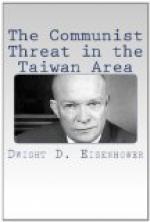This means that, in our view, negotiations and conciliation should never be abandoned in favor of force and strife. While we shall never timidly retreat before the threat of armed aggression, we would welcome in the present circumstances negotiations that could have a fruitful result in preserving the peace of the Formosa area and reaching a solution that could be acceptable to all parties concerned including, of course, our ally, the Republic of China.
On the morning of August 23d the Chinese Communists opened a severe bombardment of Quemoy, an island in the Formosa Straits off the China Coast. Another island in the same area, Matsu, was also attacked. These two islands have always been a part of Free China—never under Communist control.
This bombardment of Quemoy has been going on almost continuously ever since. Also, Chinese Communists have been using their naval craft to try to break up the supplying of Quemoy with its 125,000 people. Their normal source of supply is by sea from Formosa, where the Government of Free China is now located.
Chinese Communists say that they will capture Quemoy. So far they have not actually attempted a landing, but their bombardment has caused great damage. Over 1,000 people have been killed or wounded. In large part these are civilians.
This is a tragic affair. It is shocking that in this day and age naked force should be used for such aggressive purposes.
But this is not the first time that the Chinese Communists have acted in this way.
In 1950 they attacked and tried to conquer the Republic of Korea. At that time President Truman announced the intention of protecting Formosa, the principal area still held by Free China, because of the belief that Formosa’s safety was vital to the security of the United States and the free world. Our Government has adhered firmly ever since 1950 to that policy.
In 1953 and 1954 the Chinese Communists took an active part in the war in Indochina against Viet-Nam.
In the fall of 1954 they attacked Quemoy and Matsu, the same two islands they are attacking now. They broke off that attack when, in January 1955, the Congress and I agreed that we should firmly support Free China.
Since then, for about 4 years, Chinese Communists have not used force for aggressive purposes. We have achieved an armistice in Korea which stopped the fighting there in 1953. There is a 1954 armistice in Viet-Nam; and since 1955 there has been quiet in the Formosa Straits area. We had hoped that the Chinese Communists were becoming peaceful—but it seems not.
So the world is again faced with the problem of armed aggression. Powerful dictatorships are attacking an exposed, but free, area.
What should we do?
Shall we take the position that, submitting to threat, it is better to surrender pieces of free territory in the hope that this will satisfy the appetite of the aggressor and we shall have peace?




